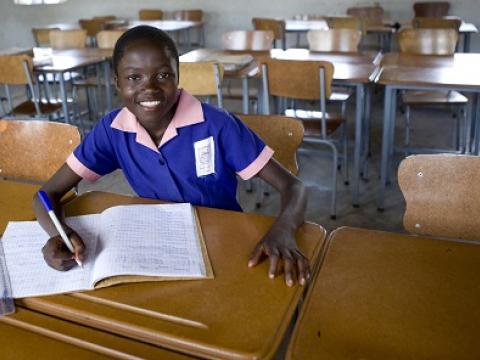Faith leaders have the power to make or break a girl’s education

By Kerin Ord,
Education Global Sector Lead
Recognising faith leaders as vital partners in ending poverty has come late to the humanitarian industry. In many countries, the influence religious leaders have over people can literally save lives. In Sierra Leone, for example, imams persuading families to forgo traditional burial rites for their loved ones reduced infection rates and helped end the Ebola crisis.
As a faith-based organisation World Vision has partnered with religious communities for decades, as advocates, fundraisers, and change agents. Today, in the nearly 100 countries where we work, faith leaders are valued partners who extend our community reach and address harmful traditional practices and norms, making our programmes viable and sustainable.
Sadly though, there have been times when one of the biggest threats to a child’s welfare was the community’s religious leaders. In parts of rural Zimbabwe, as we rolled out The Improving Girls’ Access through Transforming Education (IGATE) programme, we were horrified to learn that some ultra-conservative church communities ignored and even promoted behaviour that was harming children.
“Men would touch any parts of our bodies at church,” explained thirteen-year-old Regina, one of the girls we spoke to. “[Back] then we did not know our rights.” Regina explained that she and her peers’ health was also put at risk: “Parents would not allow us to go to the clinic believing prayer was the only answer to health problems.”
Girls as young as 12 were also subject to early and forced marriage, a harmful social-cultural practice known to put them at particular risk of sexual, physical, and psychological violence throughout their lives. Early marriage often results in early pregnancy endangering the lives of young mothers. They are also at risk of domestic violence. In almost all cases, early and forced marriage causes girls to drop out of school preventing them from getting an education.
The IGATE programme worked to identify and reduce barriers that limited and hindered girls’ ability to access and benefit from education. In addition to early marriage, barriers included a poor understanding of a girl’s potential and need for education; a family’s financial ability to send their daughter to school; the distance to and from school; the safety of the journey to school and the of school environment itself. Religious and traditional leaders’ attitudes to girls and their participation in education also posed a significant block.
To address this last issue, we and our local partners met with more than 1,700 faith leaders—both men and women—to consider what the Bible has to say about the value and dignity of women and girls. This approach, called Channels of Hope has, over the past decade reached thousands of religious leaders, encouraging them to evaluate and explore what their sacred texts actually say on issues including HIV and AIDS, gender, maternal and child health, and child protection. After our work in Zimbabwe many of the male faith leaders became champions speaking up for the rights of girls in their communities. It is estimated that around 20,000 children have benefited from the Channels of Hope approach.
As part of the IGATE programme, the girls themselves were also taught a range of skills that built their confidence, their understanding of their rights and their sense of personal power: “[I now know] with early marriage and polygamy, I have the right to say ‘no’”, said Regina. The girls’ families also learned about their daughter’s potential, her need for education and protection, and school staff were encouraged to think how to make school a safe and girl-friendly place to learn.
Education in a violence-free environment allows children to realise their full abilities, reach their highest educational attainment and grow up with dignity, confidence and self-esteem. World Vision has this week called on authorities to ban all forms of violence in and around schools. But as a Christian agency we are particularly eager that the faith leaders of communities—as custodians of religious and cultural values—not only follow the law protecting children, but also lead efforts to transform any harmful cultural attitudes and practices that perpetuate violence against children in schools.
Click here to read a summary of our latest policy on Ending Violence Against Children. You can also learn more about the Improving Girls’ Access through Transforming Education programme here.